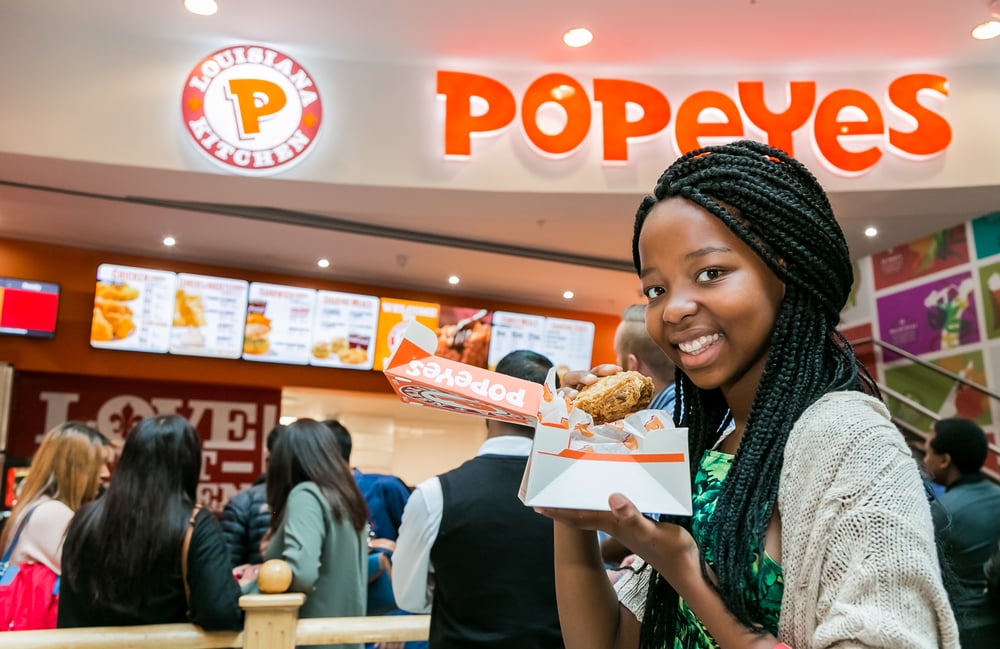
Restaurants, in general, have not had a great second quarter, and as the numbers come back, we're seeing just how deep the damage went. Restaurant Brands (NYSE:QSR), the parent brand of several major franchise names, recently reported its earnings; though it turned in some positive numbers, and beat expectations, it shows us just how bad things were this quarter.
The Numbers Won Out, If Just Barely
The good news for Restaurant Brands, the parent company of quick-service restaurant chains Burger King, Popeye's, and Tim Horton's, is that revenue came in at $0.33 per share, which was $0.04 above what was estimated. Though its quarterly revenue was down 25%, it also managed to beat expectations, which suggests that the company might have been saved by diminished expectations more than actual performance.
Revenue expectations came in at $1.05 billion, which is almost exactly what was produced. This would make any win in revenue measurable in about the seven-figure range, which for a company posting a billion in revenue is a fairly small percentage. About the only real high point in the numbers returned were online sales, which ramped up to more than double the same time a year ago.
A Whole Greater Than the Sum of its Parts
If there's one thing that Restaurant Brands' second-quarter reporting demonstrates cleanly, though, it's the value of a diversified portfolio. Taking a look at the individual components of this chimera show that there's a lot of value to be had in having several different revenue streams.
Tim Horton's is the brand that's normally responsible for about 60% of revenue in the Restaurant Brands umbrella. This time, though, its same-store sales were down 29.3%, likely because so many people weren't going out to work, and as such, weren't bothering to pick up that all-important donut and coffee combination before heading in. Indeed, several other store brands including Starbucks (NASDAQ:SBUX) and Taco Bell (NYSE:YUM) are both reporting declines in breakfast access.
Burger King, meanwhile, lost 13.4% of same-store sales, with US sales dropping 9.9% total. Improvement is starting to be seen on the Burger King front, as same-store sales for July are a match for what they were last July.
However, the real winner in the Restaurant Brands chain was Popeye's. The popular chicken chain, whose name seems to come up whenever someone wants to talk chicken sandwiches, saw its same-store sales improve 25%. Sales were also making the same recovery that Burger King's saw, and for July, same-store sales were up nearly 30 percent as compared to the previous year.
Back in Business, And Ain't It Grand?
The good news for Restaurant Brands is that it's mostly reopened. Only about 7% of its locations are still closed, with virtually all locations in the Asia-Pacific region and North America opened back up. For the EMEA—Europe, Middle East and Africa—region, that number increases to about 10%. Latin America is the biggest drag on operations at about 20% closures still in effect.
This is mitigated somewhat; the company actually excludes a location from same-store sales figures if it's been closed for any serious portion of the month, but still, that's a lot of closed-down locations. As such, the company has already stated it expects COVID-19 to have an impact on third-quarter results, though the exact extent of that impact won't be known until October or so.
Some additional good news also slipped in in that the company has paid down its $1 billion revolving credit facility, which means it should have cash enough to sustain any further unexpected shocks—like more lockdowns, which look less like a horrible notion and more like a horrible possibility with each passing day—and is even looking to restart its stock buyback operations.
The problem for Restaurant Brands here, though, is that it's got a lot of competition in the field. While Popeye's is proving to be a winner in fast-food chicken, Burger King has been taking it on the chin in the burger market. With closures and increased work-from-home weighing on the need for a fast breakfast—which isn't all that fast when you go get it and then go home with it—Tim Horton's value is likewise diminished. Restaurant Brands is making some serious progress, but there's still quite a bit weighing against it in a crowded quick-service market.
Before you make your next trade, you'll want to hear this.
MarketBeat keeps track of Wall Street's top-rated and best performing research analysts and the stocks they recommend to their clients on a daily basis.
Our team has identified the five stocks that top analysts are quietly whispering to their clients to buy now before the broader market catches on... and none of the big name stocks were on the list.
They believe these five stocks are the five best companies for investors to buy now...
See The Five Stocks Here
Unlock the timeless value of gold with our exclusive 2025 Gold Forecasting Report. Explore why gold remains the ultimate investment for safeguarding wealth against inflation, economic shifts, and global uncertainties. Whether you're planning for future generations or seeking a reliable asset in turbulent times, this report is your essential guide to making informed decisions.
Get This Free Report
Like this article? Share it with a colleague.
Link copied to clipboard.